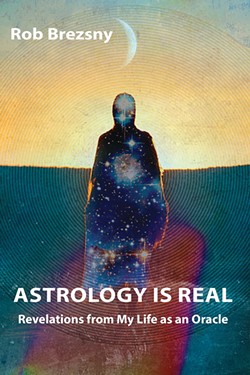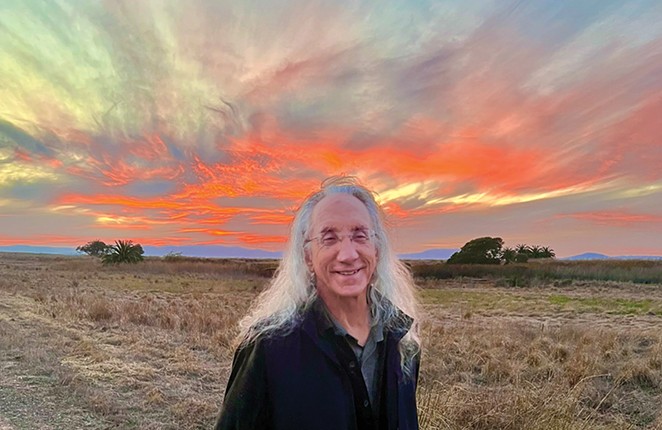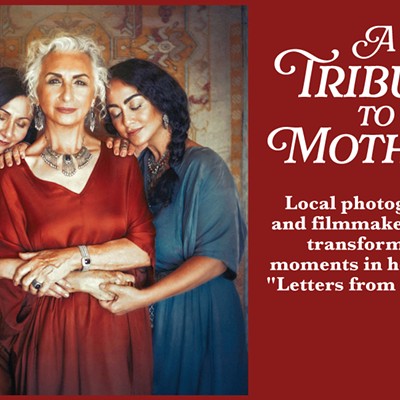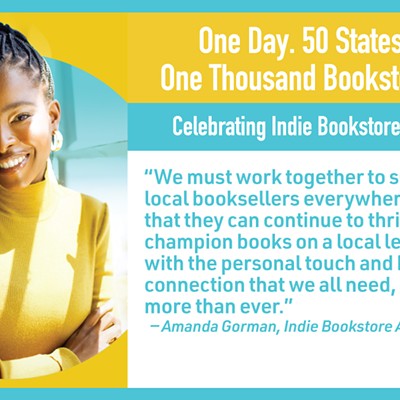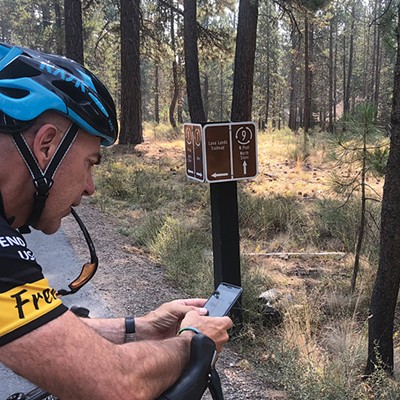Just when you think you know your astrologer, he goes and surprises you with a radical centrist call to action.
Maybe I should have seen it coming. Rob Brezsny's "Free Will Astrology" column has been delighting alt-weekly readers and wisdom seekers since 1978. His madcap mastery of the language, unpredictable wisdom and huge breadth of knowledge about science, poetry and great thinkers always make him an enlightening read.
I figured his new book, "Astrology Is Real: Revelations from My Life as an Oracle," would bounce me out of my ruts the way his weekly oracles always do, reminding me to be both braver and less bratty, more playful in the day-to-day and more serious about heeding my soul's imperatives.
I also figured there would be excellent trivia in this, his first book on astrology.
It did and there was, in spades. This book is enormous fun and a breezy read, chockablock with Brezsnian stories, quotes and inspiring essays in dozens of bite-sized portions, some satisfyingly deep and others just a few lines long. It's made to be opened at random, like a good-vibes game of roulette crossed with a self-help treasure hunt. Gems twinkle on every page.
In a list of "Tips to Promote Self-Management," he suggests we "Steal away from deals that erode your confidence . . . Trade certainty for freedom . . . Live in the flood of your playful assent." From a collection of alternative salutations, he proposes: "Ride hard. See deep. Speak true. Live free." Also: "Nice shoes!"
But here's what I forgot. Behind the wordplay, Brezsny deals in big themes. He's dead serious about the threats modern life poses to the collective unconscious. "Astrology Is Real" challenges fundamentalism, specifically scientism, the belief that scientific thinking is the only way to understand the world. A powerful bias hiding in plain sight, it underpins the education system, the media and entertainment industry. Most of us are in thrall to it, whether we realize it or not. And scientism, it turns out, is especially good at doing something all strains of fundamentalism seek to do.
'Messy fun'
In Brezsny's view, scientism's definition of what is knowable shrinks the world to a bloodless version of itself. In their scorn for what he likes to call The Other Real World, where reality plays out on different planes—through dreams, mythology, telepathy, psychedelics and, yes, astrology—the ultra-rationalists disqualify whole swaths of human experience.
These modes of inquiry are the tools of indigenous people everywhere. Our ancestors used them. They're imaginative ways of trying to understand life and our place in it. They are ways of becoming aware of our own souls and those of other living creatures.
Brezsny proposes a middle course: Believe in science but explore all possibilities, including the possibility that science can't explain everything. Maintain an open mind. To illustrate this point in "Astrology Is Real," he quotes none other than that wild-eyed wingnut, Carl Sagan.
"To be certain of the existence of God and to be certain of the nonexistence of God seem to me to be the confident extremes in a subject so riddled with doubt and uncertainty as to inspire very little confidence indeed," Sagan observed. "A questing, courageous and open mind is, I think, the essential tool for narrowing the range of our collective ignorance on the subject of the existence of God."
Brezsny's dedication to moderation extends even to his own métier. "Readers of my horoscope column are sometimes surprised when I testify I believe in astrology about 80 percent," he writes in "Astrology Is Real." "By cultivating a tender, cheerful skepticism, I inoculate myself against the virus of fanaticism. This ensures that astrology will be a supple tool in my hands . . . not a rigid, explain-it-all dogma that over-literalizes and distorts the mysteries it seeks to illuminate."
'Sacred, higher octave'
If Brezsny's horoscopes are good medicine, "Astrology Is Real" is a yoga retreat on the beach with the healthiest, most delicious food and daily massages by well-paid people who enjoy their work. To sit and read it is to bathe in a kind of good radiation. Ideas and possibilities, light and humor materialize. Space opens up to think about your purpose in this world and your most important relationships. It's like hanging out with a wise friend who has no agenda for you but who helps you see things clearly. Helps you be your best self.
In the book he discusses what he calls the "I-Thou" relationship, in which "Thou" is the "sacred, higher octave of 'you.'" Early in his career as an astrology columnist, Brezsny was frequently called upon to give love advice, and he realized he was in an "I-Thou" relationship with his readers. They shared an intimate connection, and he strove to be worthy of their trust and the honor of being in relationship with them. He coined his own "sacred, higher octave" term for "I" to indicate that state of being: I2.
"I2 aspired to see the glad genius in every THOU as well as the suffering struggler trying to find their way home to deeply felt meaning and purpose," he writes in "Astrology Is Real." "I longed to give them personal, intimate, playful versions of loving care that maybe only a dreamy stranger could provide."
That kind of loving care is why I read Brezsny. I think it's why a lot of people read him. He provides something readers crave: not-annoying words of wisdom, seemingly cooked up with you and me in mind, about shit that matters. Soul and love and life purpose and how to be a better person and things like that. But fun.
To paraphrase a couple of his other salutations, it's like the light and dark in him recognizes the light and dark in us, wishes us a happy permanent eternal world orgasm, and reminds us that marvels and wonders are coming our way.

